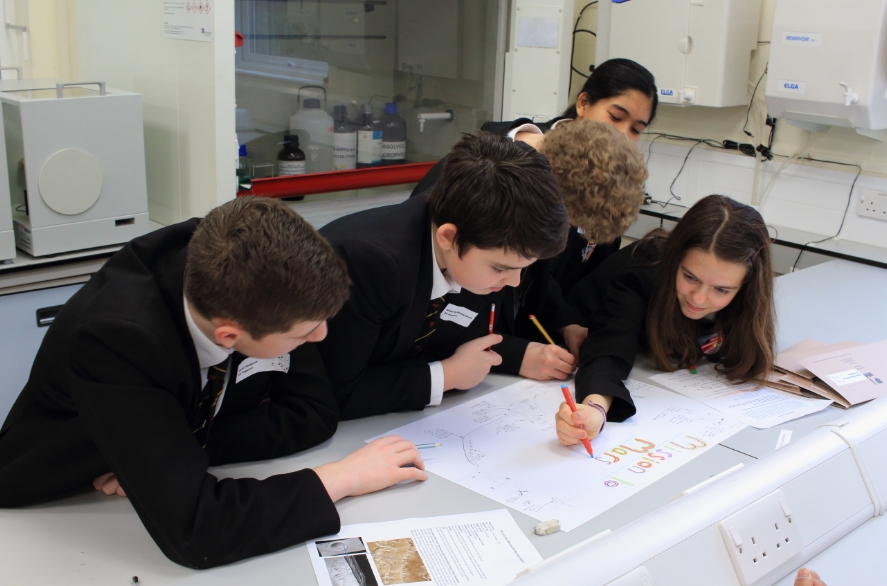This March’s Enquiry Zone is something new for I’m a Scientist. This time, it’s all about you helping school students design and carry out their own research. By talking with students in live chats and answering their questions in ASK, together you’ll come up with a potential citizen science project related to your research that can be done in a school environment.
Helps students carry out a citizen science project in their schools in the Enquiry Zone
After two weeks of online discussion, the students will vote for one project to receive £500 in funding. You will then help the schools carry out the research in June 2017, recording and sharing your results using the nQuire-it online platform developed by the Open University (www.nquire-it.org).
You don’t need to have a research question decided now: Your aim during the course of the zone is to help the students come up with and refine a research question and the appropriate methods. This process is called ‘co-creation’ and it is a central part of engaging citizen science.
Interested? Apply!
The Enquiry Zone is open to all scientists from any field, including those who’ve taken part in I’m a Scientist previously. To apply, read the FAQ below and then follow the appropriate link here:
I haven’t applied for I’m a Scientist previously: Apply now at imascientist.org.uk/scientist-apply and choose ‘Enquiry Zone’ on the following form that you are emailed.
I’ve applied before or ‘I’ve taken part in IAS previously: Go straight to this form and select Enquiry Zone when asked.
Could you seeing what birds like which food?
Enquiry Zone FAQ
What sort of projects work well in citizen science?
Exactly what you investigate and the sort of data you collect is up to you and the students to work out together. As a general rule, citizen science projects work well when the research question is relevant to the ‘citizens’ and the data is easy to collect.
Imagining what you can actually do in a school could be tough for you as a scientist. Handily, you’ll be able to consult the experts: Ask the students what they think works in a school environment.
What is the schedule?
- 30th January: Deadline to apply for the zone, include the general area of research you want to investigate.
- 5th Feb: Scientists and schools selected for Enquiry Zone
- 6th-17th March: IAS event and winning project voted for.
- April: Final plan for research project.
- June: Carry out research with schools.
What do I need to submit to apply for the zone?
Apply through the normal scientist application form. You’ll then receive an email asking you to choose a zone. On that form select ‘Enquiry Zone’ and then leave a short, accessible description of the research area you’re interested in, i.e. I want to investigate athletic performance of school children.
If you’ve already applied for IAS, or taken part previously, go straight to the form here: Choose Zones Form.
What happens if I win the Zone?
You receive £500 to help set up the research project, and we’ll put you in direct contact with teachers at the schools from the zone. You’ll then be committed to working with the schools from March up to June and the end of the project.
What can I do with the £500?
You can use the £500 to support your work on the project in any way, for example covering travel and time expenses or buying software for analysis.
Could you measure noise levels? | Image: nQuire-it
How can we use the nQuire-it online platform?
nQuire-it is an open platform where you can easily create and manage projects (called Missions). There are three types of mission that the platform supports:
- Spot-it missions let people upload, share and comment on images, for example to identify cloud formations, or spot winter wildlife.
- Sense-it missions work with the Sense-it Android app to access a range of sensors on Android phones. Examples include creating a noise map of a local area, or finding the relationship between air pressure and rainfall. (https://play.google.com/store/apps/details?id=org.greengin.sciencetoolkit&hl=en_GB)
- Win-it missions set challenges with prizes for winners, for example to find creative ways to attract bumblebees to a garden.
You may decide to combine more than one nQuire-it mission in your project.
Will I have support when doing the research project?
Yes, the Open University nQuire-it team (nQuire-it@open.ac.uk) can provide technical assistance and advice on using the platform and you can get in touch with us to talk about progress at any time.
Your role will be that of principal investigator. The schools may also want to be involved as much as possible in all aspects of the research from data collection through to analysis and writing up.
Could you spot snowflake shapes (maybe not in June)? | Image: nQuire-it
How good is the data collected?
- The quality of data will depend on what you choose to measure and how easy it is to get right.
- There is the potential for hundreds of school children to contribute data.
- Even poor data is an opportunity for the schools to think about what makes good data and how they could improve.
Could our results be published?
It’s important to remember that the main aim of the zone is for students to get experience of carrying out their own research. However, if the data collected is of good enough quality, why not publish?
What happens if I don’t win the Zone?
If you’re still keen to run the research project you’ve devised with students over the course of the zone we will happily put you in contact with interested schools so you can explore ways of making it happen.
More questions? Get in touch with antony@gallomanor.com or call 01225 326 892
Enquiry Zone: What’s it all about? – For Scientists
Posted on January 18, 2017 by in News. Comments Off on Enquiry Zone: What’s it all about? – For Scientists





